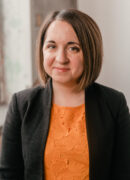Course Information
| Session |
|---|
| Credits | 1.5 CEUs or 15 PDHs |
|---|---|
| Registration dates | We accept registrations through the first week of classes, unless enrollment is full, and unless the class was canceled before it started due to low enrollment. |
$250.00
Credits: 1.5 CEUs or 15 PDHs
Learn how to create specialized collections to serve people with disabilities more inclusively at your library. In this course, learn how to develop accessible collections to support individuals who are deaf or hard of hearing, those with Alzheimer’s Disease, Dementia, Autism Spectrum Disorder, learning disabilities, blindness or low vision. Gather best practices for working with disabled community members and disability organizations to plan, assess and evaluate these collections, and gather tips for creating custom catalog and item records.
Learning Outcomes: Participants will learn:
• Background information about different disabilities, including but not limited to Alzheimer’s, Autism Spectrum Disorder, Dementia, Dyslexia, Deafness/Hard of Hearing, and Low Vision
• Strategies for community assessment, evaluation, and surveys about library collections
• Information about cultivating partnerships, collaboration, and co-creation to uplift diverse voices of disability experiences in the community
• Examples and ideas for library collections serving individuals with disabilities
• Best practices for developing identity-centered and inclusive cataloging records
| Session |
|---|
| Credits | 1.5 CEUs or 15 PDHs |
|---|---|
| Registration dates | We accept registrations through the first week of classes, unless enrollment is full, and unless the class was canceled before it started due to low enrollment. |
Learn how to create specialized collections to serve people with disabilities more inclusively at your library. In this course, learn how to develop accessible collections to support individuals who are deaf or hard of hearing, those with Alzheimer’s Disease, Dementia, Autism Spectrum Disorder, learning disabilities, blindness or low vision. Gather best practices for working with disabled community members and disability organizations to plan, assess and evaluate these collections, and gather tips for creating custom catalog and item records.
Learning Outcomes: Participants will learn:
• Background information about different disabilities, including but not limited to Alzheimer’s, Autism Spectrum Disorder, Dementia, Dyslexia, Deafness/Hard of Hearing, and Low Vision
• Strategies for community assessment, evaluation, and surveys about library collections
• Information about cultivating partnerships, collaboration, and co-creation to uplift diverse voices of disability experiences in the community
• Examples and ideas for library collections serving individuals with disabilities
• Best practices for developing identity-centered and inclusive cataloging records
 Renee Grassi (she/her) is a librarian, educator, trainer, author, and consultant for libraries. She earned her Bachelor of Arts in English Literature with a concentration in Education from Marquette University in Wisconsin, and she received her Master’s Degree in Library and Information Sciences from Dominican University in Illinois. She has worked as an Adjunct Professor for St. Catherine University in Minnesota teaching Services to Children and Young Adults. Renee has worked in public libraries for over 18 years with over 13 years’ experience in library management and administration. Renee is a #NeurodivergentLibrarian and is passionate about equity, diversity, inclusion, and accessibility. Forever a children’s librarian at heart, Renee and her four cats (Luigi, Dante, Bruno and Elena) live in the suburbs of Chicago.
Renee Grassi (she/her) is a librarian, educator, trainer, author, and consultant for libraries. She earned her Bachelor of Arts in English Literature with a concentration in Education from Marquette University in Wisconsin, and she received her Master’s Degree in Library and Information Sciences from Dominican University in Illinois. She has worked as an Adjunct Professor for St. Catherine University in Minnesota teaching Services to Children and Young Adults. Renee has worked in public libraries for over 18 years with over 13 years’ experience in library management and administration. Renee is a #NeurodivergentLibrarian and is passionate about equity, diversity, inclusion, and accessibility. Forever a children’s librarian at heart, Renee and her four cats (Luigi, Dante, Bruno and Elena) live in the suburbs of Chicago.
Reviews
There are no reviews yet.